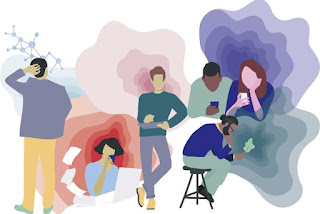3 Surprising Factors That Affect Your Mental Health
Mental health is a crucial aspect of our overall well-being,
yet it is often overlooked and not given the attention it deserves. While many
of us may think that our mental health is solely dependent on our thoughts and
emotions, there are actually several surprising factors that can greatly impact
our mental well-being. As a psychiatrist in
Bhopal, I have
seen firsthand how these factors can affect an individual's mental health. In
this blog post, I will discuss three surprising factors that can have a
significant impact on your mental health.
1) Diet and Nutrition:
It's no secret that our diet and nutrition play a vital role
in our physical health, but it is often overlooked when it comes to mental health.
What we eat can have a direct impact on our mood, energy levels, and overall
mental well-being. For example, a diet high in processed foods, sugar, and
unhealthy fats can lead to inflammation in the body, which has been linked to
depression and anxiety. On the other hand, a diet rich in whole foods, fruits,
vegetables, and healthy fats can help improve mood and reduce symptoms of anxiety
and depression.
As a psychiatrist, I always encourage my patients to make dietary changes as
part of their treatment plan, as it can have a significant impact on their
mental health.
2) Sleep:
In today's fast-paced world, sleep is often sacrificed for
work, socializing, or binge-watching our favorite shows. However, lack of sleep
can have a detrimental effect on our mental health. When we don't get enough
sleep, our brain's ability to process emotions is affected, making us more
irritable, anxious, and prone to negative thinking. Chronic lack of sleep has
also been linked to an increased risk of developing mental health disorders
such as depression and bipolar disorder. As a psychiatrist, I always stress the
importance of getting enough sleep to my patients and recommend at least 7-9
hours of sleep every night for optimal mental health.
Also Read: Sleep Disorder Treatment in Bhopal
3) Social Media:
In today's digital age, social media has become an integral
part of our lives. While it has its benefits, such as staying connected with
friends and family, it can also have a negative impact on our mental health.
Studies have shown that excessive use of social media can lead to feelings of
loneliness, envy, and low self-esteem. It can also contribute to the
development of anxiety and depression, especially in young adults.
Also Read: OCD Treatment in Bhopal



Comments
Post a Comment